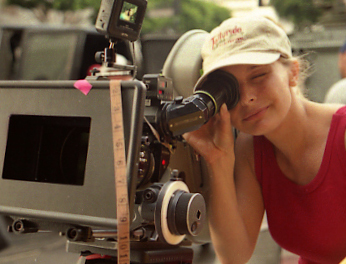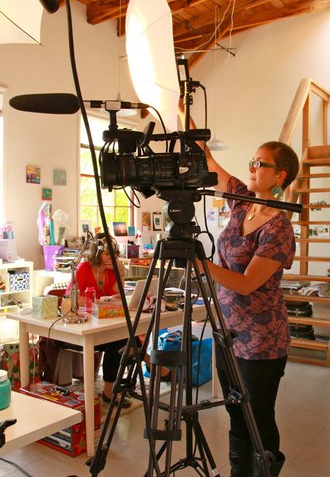
Photo courtesy of Josh MacLeod
Days before the premiere of her, what has been described as, gritty episode Salvation Released, executive producer Allen Sowelle reached out to writer and director Nikol Hasler.
So hey Nikol, first, how did you become involved with FSC? And second, how did you arrive at this topic?
I had the pleasure of being employed by One Economy when the project was green lit. In those earlier days, when we were conceptualizing scripts, I had an idea for one about a young man being released from prison and trying to return to his life without returning to the things in his life that landed him in prison. As I was writing, I realized that my authenticity would be best used if I wrote about what I knew instead. Having grown up poor, in the Midwest, these characters are very true to the people I used to run with.
We often hear that crystal meth is a poor man’s cocaine. But there is something far more insidious about this particular drug, isn’t there?
It’s easy to make meth. It’s inexpensive. And it keeps you high for a long time.
But there is also something inherently different about the person who finds themselves addicted to meth than the person who uses cocaine. The willing acceptance of the rapid physical effects of meth, the ease of the lifestyle of isolation, and the need for the drug are not commonly seen in people with resources, money, and education.
What would you suggest to someone who might find themselves in Sharon’s situation?
It was important to me to show the deepness of the love that the Sharon and Terry have for each other, and I needed to show that it is two sided. Sharon isn’t wrong to love him, and the most likely outcome in relationships like theirs is that they will continue to enable each other, use drugs together, and end up back in jail. I could say that they’ll die from it, but for the sake of honesty, I need to say that it’s highly unlikely. But there are worse things than death, specifically the slow disintegration of quality of life that goes hand in hand with addictions.
People who find themselves in the situation of leaving a jail or prison to return to their community should be sure that they put a support network in place before they are released. That’s easier said than done, and all to often jail is just a natural part of life. Unless people somehow become aware not only that their current lives are crap, but also that there is a better life available, they will continue to do what they have always done. What we need to do is find a better way to lead them to that conclusion and support them once they reach out.
Some would say the so-called War on Drugs has only perpetuated drug use in the US. And that in essence it’s been a War on the Poor and the most disenfranchised. What do you think needs to change in the conventional wisdom around drug use?
There’s not enough honesty, and once people find out that they’ve been lied to, they don’t trust anything they hear. Think of the kid who is told that if he has unprotected sex, he’s going to immediately get a girl pregnant or get an STI. Then he does it, and she doesn’t get pregnant, and he doesn’t catch anything. All of a sudden, he’s pretty convinced that adults are full of crap. Well, the government and the media need to be accountable to us when it comes to providing us with accurate, comprehensive drug information.
As a mother of three incredibly bright young boys, what do you communicate to them about avoiding the perils that seem to plague so many kids today in our overly stimulated society?
I don’t talk to my kids. Ever. It’s for the best.
But, if I did, I’d be completely honest with them.
It’s been several months since production, how does it feel looking back at these well-crafted performances?
The experience of working with Stefan and Brandice was really inspiring. They were both able to take pieces of themselves, albeit dark or difficult pieces, and bring those forward for these roles. I’ll never forget, during casting, when Stefan came in and absolutely nailed Terry’s character. He was even wearing sweat pants and looking pretty rough. I had this moment where I thought, “Either he’s a really good actor, or this dude is an actual tweaker.” And Brandice, coming from the midwest, was able to understand the small town mentality that leads to the kinds of situations Sharon would find herself in.
Anything new you’re working on, that you’re excited about, that we can look forward to?
Right now most of my focus is on finding funding for my documentary, Age Out. The doc is about the process of aging out of the foster care system, and our talented team has put together a solid treatment. Now, we just need to find people who can fund us. Other than that, I’m constantly dreaming up new projects and ideas.

 This week we get a twofer: writer of What now? Bradd Bowden, and his childhood friend, producer of Front Seat Chronicles, Josh Feinman, who also directed this week’s episode.
This week we get a twofer: writer of What now? Bradd Bowden, and his childhood friend, producer of Front Seat Chronicles, Josh Feinman, who also directed this week’s episode. This week we continue the inside scoop with actor, producer, writer and director – Elle Travis – in conversation with Producer Allen Sowelle.
This week we continue the inside scoop with actor, producer, writer and director – Elle Travis – in conversation with Producer Allen Sowelle.

 We reached out to writer Scott Kassel to get the inside scoop on Every Other Weekend.
We reached out to writer Scott Kassel to get the inside scoop on Every Other Weekend.